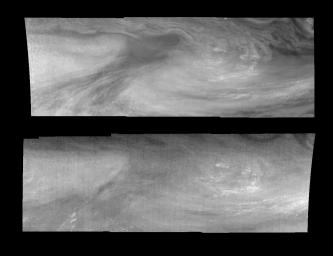
|
Jupiter’s Equatorial Region in the Two Methane Bands (Time Set 2)
- Click the image above for a larger view
- Full-Res JPEG (1300 x 1000) (110.2 kB)
- Full-Res TIFF (1300 x 1000) (760.9 kB)
Caption:
Mosaics of an equatorial "hotspot" on Jupiter at 727 nanometers (top) and 889 nanometers (bottom). The mosaics cover an area of 34,000 kilometers by 11,000 kilometers. The darker region near the center of each mosaic is an equatorial "hotspot" similar to the Galileo Probe entry site. These features are holes in the bright, reflective, equatorial cloud layer where warmer thermal emission from Jupiter's deep atmosphere can pass through. The circulation patterns observed here along with the composition measurements from the Galileo Probe suggest that dry air may be converging and sinking over these regions, maintaining their cloud-free appearance.
Light at 727 nanometers (nm) is moderately absorbed by atmospheric methane. This mosaic shows the features of Jupiter's main visible cloud deck and upper tropospheric haze, with higher features enhanced in brightness over lower features. Light at 889 nm is strongly absorbed by atmospheric methane. This mosaic shows the features of a hazy cloud layer tens of kilometers above Jupiter's main visible cloud deck. This haze varies in height but appears to be present over the entire region. Small patches of very bright clouds may be similar to terrestrial thunderstorms. Together images at these wavelengths provide a three dimensional view of the cloud layers in Jupiter's atmosphere.
North is at the top. The mosaics cover latitudes 1 to 10 degrees and are centered at longitude 336 degrees West. The smallest resolved features are tens of kilometers in size. These images were taken on December 17, 1996, at a range of 1.5 million kilometers by the Solid State Imaging system aboard NASA's Galileo spacecraft.
Background Info:
The Jet Propulsion Laboratory, Pasadena, CA manages the mission for NASA's Office of Space Science, Washington, DC.
This image and other images and data received from Galileo are posted on the World Wide Web, on the Galileo mission home page at URL http://galileo.jpl.nasa.gov. Background information and educational context for the images can be found at http://www.jpl.nasa.gov/galileo/sepo .
Cataloging Keywords:
| Name | Value | Additional Values |
|---|---|---|
| Target | Jupiter | |
| System | Jupiter | |
| Target Type | Planet | |
| Mission | Galileo | |
| Instrument Host | Galileo Orbiter | Galileo Probe |
| Host Type | Orbiter | Probe |
| Instrument | Solid-State Imaging (SSI) | |
| Detector | ||
| Extra Keywords | Atmosphere, Grayscale, Haze, Methane, Storm, Thermal | |
| Acquisition Date | ||
| Release Date | 1998-03-06 | |
| Date in Caption | 1996-12-17 | |
| Image Credit | NASA/JPL-Caltech | |
| Source | photojournal.jpl.nasa.gov/catalog/PIA01186 | |
| Identifier | PIA01186 | |
